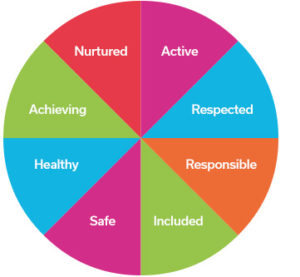Training
Module One - Introduction and Background
The vision for Scotland's children and young people is for them to reach their full potential and be successful learners, confident individuals, effective contributors and responsible citizens.
Getting It Right for Every Child aims to ensure that all children and young people are fully supported by keeping their wellbeing at the heart of its approach.

The Getting it right for every child approach is about how practitioners across all services for children, young people and adults meet the needs of children and young people, working together where necessary to ensure they reach their full potential. It promotes a shared approach and accountability that:
- builds solutions with and around children, young people and families
- enables children and young people to get the help they need when they need it
- supports a positive shift in culture, systems and practice
- involves working better together to improve life chances for children, young people and families
GIRFEC is a way of working which focuses on improving outcomes for all children and young people by placing the child/young person at the centre of thinking, planning and action.
It is relevant for every service that impacts on children and young people, including adult services working with parent(s)/carer(s).
It builds from universal services, moving from crisis intervention to early intervention.
It streamlines processes and uses best practice in information sharing.
What is GIRFEC?
GIRFEC is a national approach to supporting and working with all children and young people in Scotland.
The approach is about how practitioners across all services for children, young people and adults meet the needs of children and young people, working together where necessary to ensure they reach their full potential. It promotes a shared approach and accountability that:
- places children and young people’s needs first. It ensures they are listened to and understand decisions that affect them. GIRFEC ensures they get more co-ordinated help to improve their wellbeing, health and development. Solutions are built with and around children, young people and their families.
- requires that all services for children and young people including Health, Education, Social Work, Police, Housing, Children’s Reporter, Voluntary Organisations etc, streamline their systems and processes to improve how they work together to support children and young people so that they get the help they need when they need it.
- encourages earlier intervention by professionals and supports them to share information and work better together to improve outcomes for all children, young people and their families.
What GIRFEC means
For Children, Young People and Families
- they feel confident about the help they are getting
- they understand what is happening and why
- they have been listened to and their views noted and taken into consideration
- they are appropriately involved in discussions and decisions that affect them
- they can rely on appropriate support and help being available when they need it
- they experience a co-ordinated and streamlined response from practitioners
For Practitioners
- putting the child/young person at the centre and developing a shared understanding within and across agencies
- using common tools and processes, considering the child or young person as a whole and promoting close partnership working with other agencies as appropriate
For Managers in children’s services
- providing strategic and leadership support to embed the GIRFEC approach in practice within and across agencies
- support changes to practice and child/young person centred processes
Information Sharing
In Ayrshire we have an agreed information sharing protocol.
The Partners are East, North and South Ayrshire Councils, Health and Social Care Partnerships, NHS Ayrshire & Arran, the Voluntary Sector, Police Scotland, Scottish Fire and Rescue Service and the Scottish Children’s Reporter Administration.
All of the partners have different functions and responsibilities but we need to share information between and among ourselves at different times and for different purposes. We can do this electronically, verbally or in writing.
The guidance for information sharing is within the GIRFEC Ayrshire Practitioner Guide, chapter 5. For ease, you can find this document, along with the Ayrshire Information Sharing Flowchart and the Charters for Children and Young People and Parent)s) and Carer(s) below:
Information sharing charter – Parent(s) and Carer(s)
DownloadInformation Sharing Charter – Children and Young People
DownloadDownload the Ayrshire Practitioner Guide
DownloadDownload the Ayrshire Information Sharing Flowchart
DownloadAYRshare
AYRshare is the system used to share information on children, young people and their families with all members of the Team with the Family. The system is used to share the child/young person’s plan (‘My Plan’) and also to compile an integrated chronology of significant events.
Significant events from all agencies are included in the chronology and this is used as a tool to safeguard a child/young person.
Other appropriate documents can be included in the child/young person’s folder including Request For Assistance forms, Co-ordinated Support Plans, Individualised Learning Plans etc.
All practitioners working with a child/young person should have an AYRshare account and contribute when a child/young person has a plan (‘My Plan’).
There are Quality Assurance Standards for AYRshare. You will find the full AYRshare User Guide, Quick Guide and the Quality Assurance Standards below:
(Documents will be uploaded in due course)
AYRshare User Guide
Quick Guide
Quality Assurance Standard 1
Quality Assurance Standard 2
Quality Assurance Standard 3
Quality Assurance Standard 4
Quality Assurance Standard 5
Quality Assurance Standard 6
The use of AYRshare is not optional.
There is also a Charter for Children and Young People and Parents and Carers and these can be found below:
Parents and Carers


